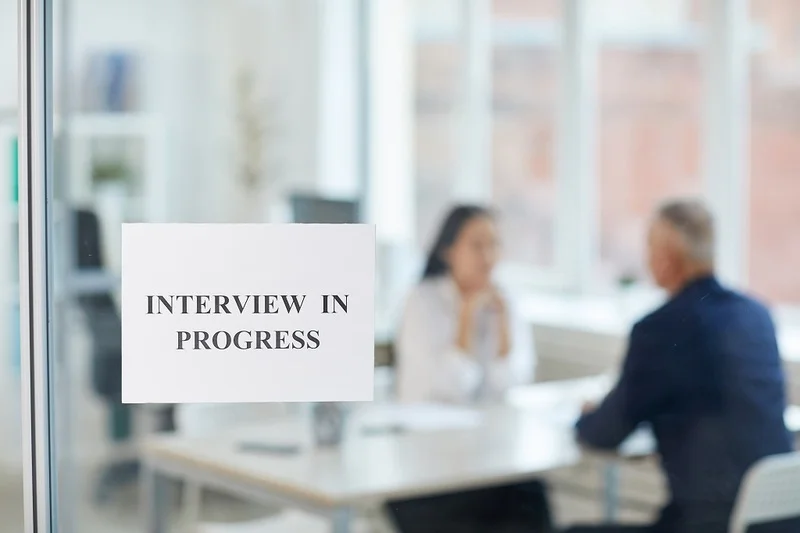Job interviews allow you to be in the spotlight. It is tough, but you aim for that spot to be considered for the position. What prolongs your burden during the first interview, however, is that you are clueless about how long you’re going to sit there answering more follow-up questions. The thing is, the pressure, panic, and anxiety will eventually pass if you are absolutely ready for the big day.
You might have asked at some point in your job search, “How long do first job interviews last?” Relax; you will figure it all out. Besides, we’ve got you covered in this article. This article aims to let you grasp the fundamentals of job interviews, the impact of anxiety on performance, the significance of knowing the duration of first job interviews, how to make a good impression in a longer interview, and tips when preparing for it. Read on.
The Importance of First Job Interviews
You are given the chance to make an outstanding first impression during your first job interview. In addition to being ready for questions that might be asked, you also need to be aware of what the company does. Your ability to progress forward in the interview process and secure your first job offer depends on how you respond to the interviewer’s queries.
Related Article:
When Potential Employers Ask You to Tell Something About Yourself
Understanding Nervousness and Its Impact on Performance
Anxiety naturally surfaces in first job interviews. In fact, in office settings, being anxious is a natural occurrence, including when you attend a crucial meeting, give a critical presentation, and chase approaching deadlines. It is vital to know its effect on your performance, so you’ll know how to handle it. The following are its impacts:
- On emotions: You may experience a rolodex of emotions, including fear, worry, uncertainty, humiliation, and self-doubt. All these will lead to substantial distress and impair your ability to leave a positive impression.
- On cognition: It can result in excessive self-criticism, irrational expectations, and a sharpened focus on failure. Such thinking weakens a person’s self-confidence and feeds the cycle of fear.
- On interaction: It might put tension on connections with friends, family, and coworkers. You may become aloof and uncooperative, which would further isolate you from your peers and even coworkers and put extra pressure on yourself.

How Long Do First Job Interviews Last?
To put it simply: The length of an interview might range from 15 to 30 minutes to a couple of hours. The setup of the interview, among other things, affects how long it will last. You could even experience many interview styles throughout the employment process. These include:
Preliminary / Beginning Interviews
First job interviews may last between 30 and an hour, which is longer than screening interviews. They might ask deeper, open-ended inquiries that call for more detailed responses.
Phone Interviews
The first interview throughout the hiring process is conducted over the phone, during which recruiters confirm the information on the resume and ask about start dates and scheduling flexibility. They might also evaluate your ability to work with others, overcome stress, and manage your time. The interview lasts 15 minutes on average; however, it might be prolonged to 40 minutes if recruiters inquire further about work style.
Face-to-Face Interviews
Based on the recruiting manager’s requirements and the need to meet many employees, in-person interviews can run 45 to 90 minutes. Certain companies may even schedule a full day of interviews when candidates must perform essential job functions while being supervised. It may involve getting to know future coworkers as well as a variety of questions to gauge your ability for the job. Multiple supervisors and coworkers participate in panel interviews as well as final in-person interviews to discuss essential parts of the job like pay, hours, and perks.
Video Interviews
The length of a video interview can vary based on its objective and the interviewing stage. If a video interview is conducted instead of a phone interview, it might be quicker. Hiring managers may conduct video interviews for remote roles at all stages, which can last up to several hours.
Tech-Related Interviews
Companies perform 45- to 60-minute technical interviews for engineering and software development employment. They can happen at any point during the employment process to test technical skills, and the interviewer may pose questions that need written or verbal responses.
Succeeding Interviews
Depending on their objectives and content, the second and third interviews may span a few hours. Some of them might even have many segments and last the entire workday.
Open-Recruiting Interviews
At particular gatherings or career fairs, open hiring interviews take place where interviewers go over resumes and conduct impromptu interviews. Immediately following the 30- to 1-hour-long interview, some businesses could make job offers.
Factors That Affect the Length of First Job Interviews
The appropriate length of the interview will vary based on a number of factors, which include the following:
- It was your first, second, or final interview;
- The conversation came out between the interviewers and candidates smoothly; and
- The candidate was questioned about their experience, on-the-job training, career opportunities, and expertise.

Tips for Preparing for a Long Interview
Here are four pointers for winning lengthy interview processes:
1. Look into the company and the position.
Before you proceed with, it might be best to first assess an interview opportunity based on personal and professional aspirations to determine if it’s worth the effort. Consider the position’s prospects for education, professional growth, and progress and whether those factors align with your long-term goals.
2. Make expectations clear.
Long job interviews can be taxing, but you can tolerate them if you seek clarification. To have a better idea of what to expect, you need to have effective, open communication with the recruiting manager or HR. You may ask for clarification on the number of interview phases, expected timeline, and testing sessions.
3. Explore other choices.
It’s crucial to continue looking into alternative opportunities while going through a protracted interview process. However, it is also beneficial if you don’t settle for just one possibility. To keep your options open, consider more job openings and maintain networking.
4. Be stable and consistent.
When addressing similar questions during multiple rounds of interviews with different people within an organization, it’s crucial to maintain consistency. Here’s how to efficiently tackle each round:
- Study prior interviews;
- Make your points audience-specific.
- Show progression and fresh perspectives;
- Employ storytelling strategies.
Techniques to Boost Confidence During the Interview
Dress formally.
For a more confident interview, dress professionally. Examine the company’s dress code and look for personnel images on the website. If unsure, wear something professional or business casual.
Mind your body language.
Keep your body in good posture by sitting with your arms relaxed on your lap. Inform the interviewer in advance so that accommodations can be made if you are unable to keep an upright position. Also, practice deep breathing exercises to help you think clearly during interviews.
Be prepared to answer typical interview questions.
Practice responses to frequently asked interview questions. Think about using a video conferencing tool or asking a friend or member of your family to practice. And during the interview proper, address each question one point at a time. Take some time to gather your thoughts, if necessary, then seek clarification from the interviewer.
Establish eye contact.
Avoid excessive or extended eye contact, and keep it steady and natural. Additional nonverbal indicators, such as vocalizations, can also aid in expressing confidence and showing an interest in the position.
Have a run-through of the areas of the interview.
Assess your job and possible contribution before going into the interview. Work on any areas where you may have felt discouraged. This will get you ready for a better result and make you a motivated and valuable applicant.
How to Make a Positive Impression in a Longer Interview
If your first job interview is set up, now is the time to be ready for it so you can leave the best possible impression. Consider the following tips:
1. Research the company and the role.
To feel more confident and comprehend the interviewers’ needs and goals, do some research on the organization.
2. Prepare for common interview questions.
To effectively convey your worth and interest in the position during an interview, practice responding to the typical interview questions.
3. Check the job description again.
Reread the job description and, using examples from previous and ongoing work, highlight the specific abilities the employer is looking for.
4. Create a reference list.
To speed up the hiring process and ensure a complete list, prepare a reference list for the interview.
5. Bring some samples of your work with you.
To demonstrate experience and accomplishment in the job description, prepare examples of previous work experience from previous employment.
6. Decide what to wear.
Plan your interview outfit by finding out the company’s dress code from recruiters and doing some online research.
7.Arrive on time.
Have a backup plan ready in case of delays or road closures to prepare for interviews early. Arriving 10-15 minutes early is suggested.
8. Be honest when answering the questions.
Honesty is valued by interviewers. So, emphasize your strengths and distinctive background rather than exaggerating your abilities and achievements.
9. Prepare interesting interview questions.
To show that you are serious and interested in the position, prepare thoughtful interview questions for your interviewer.
10. Send a thank-you note as gratitude.
After an in-person interview, send an email thanking them and requesting business cards so that you can send personalized follow-up emails.

Embracing the Duration of First Job Interviews
Your toughest job interview will undoubtedly be your first one. Having that said; all it takes to ensure success are two things — practice and preparation. Whether you’re actively preparing for your first interview, taking a longer or shorter interview, researching before beginning your job hunt, or simply interested in what to anticipate during the recruiting process, you have to be completely ready in all aspects. With these, you can go to your first job interview more confident than you were before.
Prepare Hard for Your First Job Interview with the Help of Career Experts
No matter how long your first job interview lasts, you should never come unarmed or unprepared. Instead of wasting your time with your jitters and being anxious, train your mind and organize your thoughts to win the battle, which is to ace the interview. With Resume Professional Writer’s across-the-board blogs on job interview tips, you are closer to reaching your career goals. For more information, read our blogs on how to have successful interviews.








